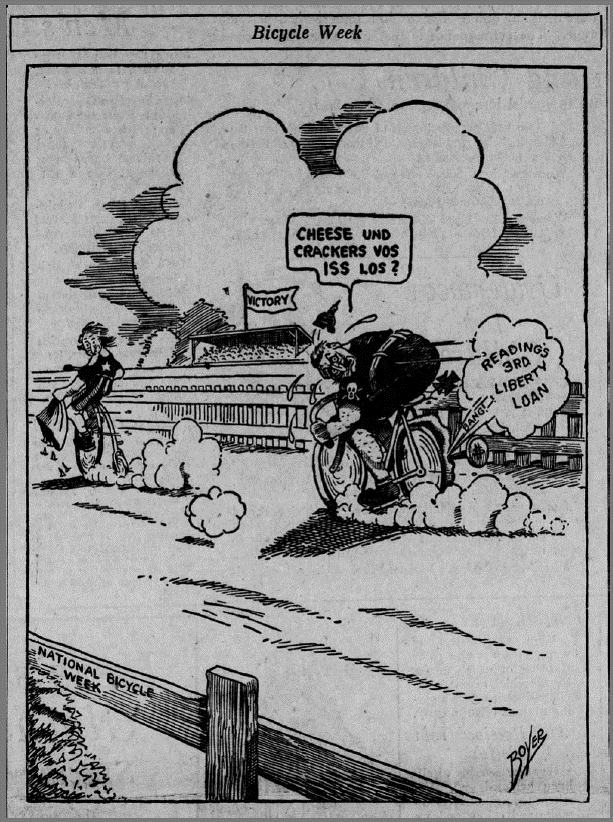By May of 1918, the citizens of Reading and Berks County were confronted with the realities of war on a daily basis. The war itself may have been fought on foreign soil, but its presence was felt intimately at home. Whether in the form of food rationing, loan drives, or new recruits leaving for camp in preparation for the battlefields of France, the never-ending sacrifices of war had a huge impact on the citizens of Berks County.
Reading Times May 1, 1918, Cole Watson
The Third Liberty Loan Drive was nearing its completion when the last fight card of the season was scheduled by Cole Watson’s Athletic Club at The Auditorium on April 30th. At the event, patrons were greeted by Sergeant Manning Grimes of Providence R.I., a wounded soldier who returned from France and made his pledge to the patrons that buying Liberty Bonds will help our boys beat the Kaiser. This was the first time boxing patrons were solicited to purchase Liberty Bonds, and the 1,000 patrons responded with bond purchases in the amount of $9,000.
In addition to raising funds, the people of Berks County were accustomed to going without in a time of war. Citizens were already rationing food on pork, meat and wheat-less days, and by the end of April 1918, the Food Administration introduced a 90-day pastry abstinence, which went into effect on May 1, 1918. The pastry abstinence was enacted to conserve flour shortly after Food Administrator Davies battled with Reading bakeries over the price of bread. The city of Reading offered residents several areas around town to start war gardens, encouraging citizens to raise their own vegetables for consumption and conserve farm produce for the war effort. Gardens sprung up all over Reading, from the Hampden and Buttonwood reservoir plots, to the grounds near Sternbergh’s Sterling and Spring and Weiser Streets. Open city blocks, city parks with reservoirs or open land on private property were all made available to Reading residents for rent or free of charge.
Reading Times · April 24, 1918
Local media encouraged citizens to do their part and get on board with the war effort. A story appeared in the Reading Times about a much-married slacker who was arrested in Reading and returned to York. Paul Sweitzer, alias George Krause, was arrested for failing to register with his draft board in York. City detectives ran down a series of clues on Sweitzer, who married 16-year-old Augusta Hunf of Reading four years prior. The two lived with Hunf’s parents until they ran away, dressing his bride as a man as they hopped freight trains toward Pittsburgh. They were attacked by tramps out west, where Sweitzer shot one of the tramps. Sweitzer spent 6 months in jail for the shooting, and police sent his wife back home. When Sweitzer returned, he took out an $1,000 insurance policy out on his wife. He then made a concoction for his wife, which made her deathly ill. Sweitzer then disappeared, as his wife was saved by means of a stomach pump from his deadly act. Two years later he published accounts of his fake death. Believing Sweitzer was dead, Hunf later married another man. Sweitzer then married again under the name of Krause. Reading police learned of Krause from his second wife, Mary Phillips. The two had lived in York and then Reading when police were on the lookout for a slacker named Sweitzer. Phillips became suspicious and reported her husband to the police, when they discovered his hidden identity.
On May 18, 1918, 2,000 women marched in the Red Cross March of Mercy, which kicked off the nation’s hundred million drive for the Red Cross, with Berks County’s quota at $150,000. Over 6,000 people marched in the parade, with Ernest J. Poole as chief marshal of the parade. The parade consisted of 5 divisions that formed in City Park and included Red Cross workers, students from the girl’s high school, fraternal organizations, loan workers, civic organizations and students from the boy’s high school. The parade began at the head of Penn Street, marched down to 4th Street and counter-marched to 10th Street before dispersing at Franklin Street. Miss Catherine Gilbert, who dressed as Miss Liberty for the Boy Scouts Liberty Loan parade in April, exchanged her Liberty costume for a Red Cross outfit for this parade.
Red Cross March of Mercy Parade Reading, PA from the Collection of Berks History Center
Gilbert had just finished up touring the county as Miss Liberty for the War Savings Stamps drive. She then began a week long 90-mile tour of Berks County for a series of open air meetings dressed as a Red Cross Nurse. The tour would leave Reading each evening at 5:30PM, making multiple stops along each route. The drive had the presence of a British and French soldier, who had seen much service in Europe. The soldiers attended meetings during the day in Reading and accompanied Miss Gilbert on the evening tours in the county. The evening tours ended with destinations in Boyertown, Hamburg, Birdsboro, Kutztown and Womelsdorf. In each instance, the tour was met with large gatherings, including parades through Hamburg and Boyertown, which were led by the local Boy Scout troops. The drive started on May 20, 1918. Typical of Berks County’s patriotic response for a drive of any type, the county doubled its quota, raising $300,000 for the Red Cross drive. The Wolfinger Knitting Mill went over the top by contributing 100 percent by May 18th, doubling their quota of $195 and thus receiving a 100 percent flag with a gold star.
Jere Edwards had just completed his Sunday lectures at the Y.M.C.A. auditorium on the war and the conditions our soldiers experienced at the front. The lectures were well attended. Edwards, the General Secretary of the Reading Y.M.C.A., left late in 1916 to work with the International YMCA in Cairo, Egypt and operate a service hut in France. He returned from Europe in November 1917.
Reading Times · May 01 ,1918
With all the happenings around Reading and Berks at this time, from food rationing and war gardens, loan drives, Red Cross parades and tours, war lectures at the Y.M.C.A., or slackers being picked up for failure to register to their draft boards, the citizens of Reading and Berks County never wavered in their commitment to their patriotic duty. At the time, reports were coming back of casualties to U.S. soldiers, who were fighting at the frontlines. Letters would appear in the Reading Times from a soldier “somewhere in France” telling of life in the trenches. The reality of the Great War left six Berks County soldiers in graves in France and one at the bottom of the Atlantic, all at the hands of the enemy. Others had died from disease. Memorial Day in 1918 had a very solemn meaning for the citizens of Berks.
Richard Polityka is a longtime volunteer at the Berks History Center and project leader of the Berks History Center’s World War I project that commemorates the 100th Anniversary of the Great War.




